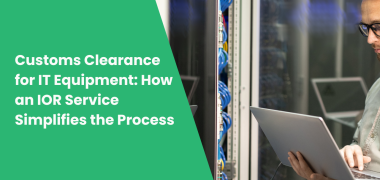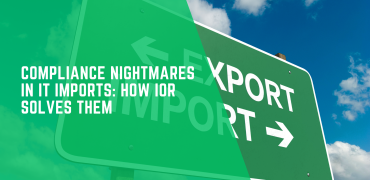In today’s globalized economy, businesses frequently source IT equipment from international markets to ensure they stay ahead of technological advancements. However, importing IT equipment—ranging from servers and networking hardware to laptops and accessories—comes with its share of complexities, particularly during the customs clearance process. This is where an Importer of Record (IOR) service proves invaluable, streamlining the logistics and legalities involved in international trade.
This blog delves into the nuances of customs clearance for IT equipment and how leveraging an IOR service simplifies the process, saving businesses time, money, and headaches.
Understanding Customs Clearance for IT Equipment
What Is Customs Clearance?
Customs clearance is a critical step in international shipping, ensuring that goods meet all regulatory requirements of the destination country. It involves:
- Submission of required documentation (e.g., invoices, packing lists, and certificates).
- Payment of customs duties and taxes.
- Adherence to regulatory compliance, including certifications and approvals for specific product categories like IT equipment.
Challenges in Clearing IT Equipment
Importing IT equipment presents unique challenges:
- Complex Regulations: Different countries have specific requirements for IT imports, such as certification of electronic devices to ensure they meet safety standards.
- High Duties and Taxes: Many IT products are subject to significant tariffs, adding to the cost.
- Data Security Concerns: Servers and storage devices may need additional scrutiny due to concerns over data security and encryption technologies.
- Customs Delays: A lack of compliance with documentation or procedural errors can lead to significant delays.
What Is an IOR Service?
An Importer of Record (IOR) service acts as the legal entity responsible for ensuring compliance with all import regulations in the destination country. The IOR handles:
- Regulatory Documentation: Preparing and submitting necessary paperwork for customs clearance.
- Customs Duties and Taxes: Calculating and paying applicable charges on behalf of the importing company.
- Product Compliance: Ensuring that the imported IT equipment meets the regulatory requirements of the destination country.
- Legal Responsibility: Acting as the official importer in the eyes of local authorities.
How an IOR Simplifies Customs Clearance for IT Equipment
1. Navigating Complex Regulations
Different countries have unique import regulations for IT equipment. For instance:
- The EU requires CE certification for electronic devices.
- The U.S. enforces strict rules on encryption technologies under the Bureau of Industry and Security (BIS).
- Emerging markets like India may require additional certifications, such as BIS registration for electronics.
An IOR is well-versed in these regulations and ensures that your shipment complies with local requirements, avoiding fines or confiscation.
2. Reducing Administrative Burden
The paperwork for customs clearance can be overwhelming, especially when importing multiple products across different categories. An IOR:
- Prepares and submits accurate documentation.
- Maintains up-to-date records of regulatory changes.
- Ensures consistency in reporting, reducing the risk of errors.
This frees up your internal resources to focus on core business activities.
3. Cost Management
IOR services help businesses manage the financial complexities of customs clearance:
- Accurate Duty and Tax Calculations: Miscalculations can result in unexpected fees or delays.
- Mitigating Additional Costs: Avoiding penalties for non-compliance or demurrage charges for delayed shipments.
- Optimized Shipping Routes: An experienced IOR can recommend routes or strategies to minimize customs duties.
4. Ensuring Compliance with Trade Agreements
Trade agreements like the USMCA, EU Free Trade Agreements, or Asia-Pacific Economic Cooperation (APEC) reduce or eliminate tariffs for eligible products. IORs ensure that all requirements are met to benefit from these agreements.
5. Minimizing Delays
Customs delays can disrupt project timelines and result in financial losses. IOR services prevent delays by:
- Ensuring documentation is error-free.
- Pre-clearing shipments where possible.
- Resolving disputes or queries with customs officials promptly.
6. Handling Returns and Repairs
Importing IT equipment for returns or repairs involves unique challenges. An IOR can manage the re-importation process efficiently by:
- Classifying goods correctly to avoid double taxation.
- Ensuring compliance with temporary import/export regulations.
Real-World Application of IOR Services
Imagine a global tech company planning to establish a data center in Brazil. The project requires importing high-value servers, networking equipment, and storage devices. Without an IOR, the company faces several hurdles:
- Navigating Brazil’s intricate import regulations.
- Ensuring all equipment is certified and complies with local standards.
- Managing high import duties and unexpected costs.
An IOR service takes on these responsibilities, ensuring the smooth delivery of IT equipment while the company focuses on launching its data center on schedule.
Choosing the Right IOR Service Provider
When selecting an IOR service provider, consider the following:
- Industry Expertise: Providers with experience in IT equipment understand the unique challenges involved.
- Global Coverage: Ensure they have a strong presence in all countries where you operate.
- Compliance Focus: Look for providers with a proven track record in regulatory compliance.
- Transparent Pricing: Choose a provider that offers clear, upfront pricing for their services.
- Customer Support: Reliable communication is essential for resolving issues quickly.
Benefits of Partnering with an IOR for IT Equipment
- Time Savings: Streamlined processes ensure faster customs clearance.
- Cost Efficiency: Accurate duty and tax calculations reduce financial risks.
- Legal Assurance: Peace of mind knowing your imports comply with local laws.
- Improved Focus: Your team can concentrate on core business operations.
Conclusion
Importing IT equipment is a complex endeavor, but it doesn’t have to be a logistical nightmare. By partnering with an Importer of Record (IOR) service, businesses can navigate the intricacies of customs clearance effortlessly. The IOR acts as a bridge, ensuring regulatory compliance, managing costs, and minimizing delays, all while allowing your team to focus on strategic priorities.
For companies aiming to expand globally and leverage the best IT equipment, an IOR service is more than just a logistical partner—it’s a strategic asset.




